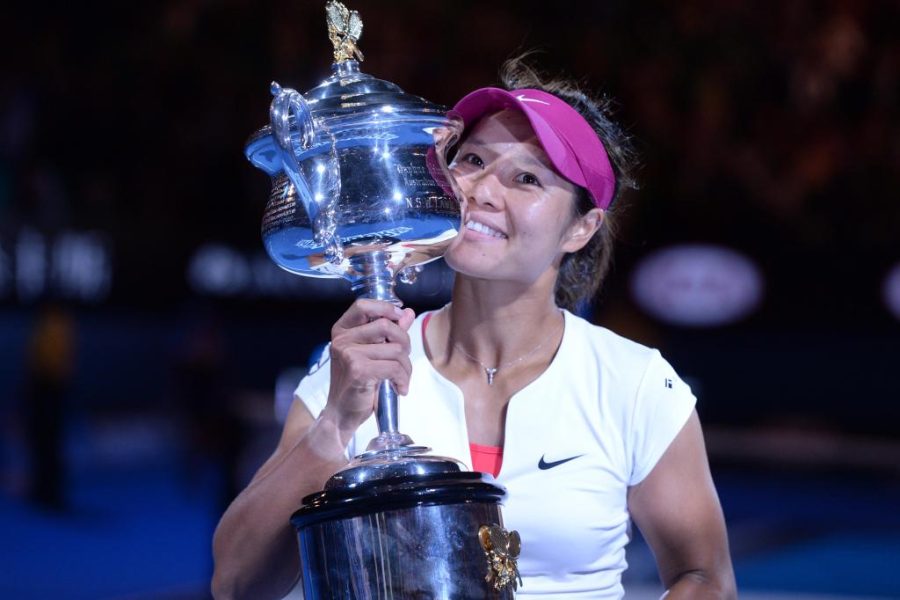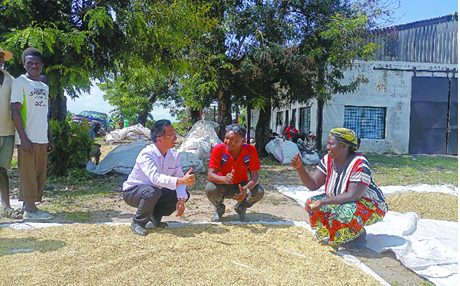MELBOURNE, Jan. 29 – After Li Na’s historic title-winning at Melbourne Park, it took a decade for another Chinese player to appear in a Grand Slam singles final. Then 11-year-old Zheng Qinwen was then glued to her television and beamed when Li lifted the Australian Open trophy.
As China’s top-ranked singles elite, Zheng demonstrated by reaching the 2024 Australian Open final that she can not only blueprint a promising future for herself, but also herald a new chapter in Chinese tennis, alongside peers like Shang Juncheng and Zhang Zhizhen.
BRIGHT FUTURE AHEAD
It was not the best tennis she had hoped for in her maiden Grand Slam final, but 21-year-old Zheng battled to the end in a 6-3, 6-2 mauling by the formidable reigning champion Aryna Sabalenka.
On Saturday night, the disappointment of not lifting the Daphne Akhurst Memorial Cup was visible on Zheng’s face during the award ceremony.
With her reddened eyes lingering on the trophy close at hand, the Chinese newcomer held back “complicated” feelings and congratulated Sabalenka on a wonderful match.
“It’s my first final and I’m feeling a little bit pity. But this is an experience for me,” said Zheng. “I really enjoyed playing in this Australian Open. That was an amazing memory for me. I’m sure there is going to be more and better in the future.”
Sabalenka added that Zheng would have a bright future in the game.
“I know this feeling is really tough to lose in the final but you are such an incredible player, such a young girl. You’re going to be in many more finals. You’re going to get it. I want to congratulate you and your team on the incredible job you have done,” said the Belarusian champion.
Zheng’s father Zheng Jianping shared Sabalenka’s view on her daughter’s potential.
“She will have a long career and her peak has yet to come,” he said.
As her coach Pere Riba said, Zheng is evolving and still has a big margin to improve in her tennis. Lessons must be taken from this top-tier showdown and a final appearance will also inspire the young Chinese to stay hungry in her fledging career.
OPPORTUNITIES FOR THOSE PREPARED
Only in her third WTA tour season, Zheng is set to break into the world top 10 when the new rankings are released next week.
Already with two WTA singles titles in hand, Zheng is now only the second Chinese player to play in a Grand Slam singles final after Li Na.
“In Grand Slams, everyone must work hard to make breakthroughs, and there will definitely be various opportunities,” said Zheng. “My breakthrough here came slower than I expected, but I still want to say that I am very proud of myself. I want to take my time and enjoy the process.”
At six years old, Zheng picked up a racquet after being intrigued by tennis at the 2008 Summer Olympics in Beijing. Traveling from Shiyan City in Hubei to the province’s capital Wuhan, Zheng stayed far away from home to live her tennis dream.
“Independent, confident, and disciplined” is how her father, a former track and field athlete, described her.
When the COVID-19 pandemic broke out in late 2019, Zheng remained in Spain for training. Under strict protocols, Zheng woke up at 4:30am to practice before the court was closed at 7am. She stuck to this schedule for four months.
In the eyes of her coach Riba, Zheng’s ethnic work makes her stand apart. “She always is ready for practice, a really hard worker,” said Riba.
“Sometimes we get angry, because she wants to do it more and I have to stop her. Then you can imagine the dreams that Qinwen has, that she really wants to be there at the top,” he noted.
Zheng’s long-term efforts has been gradually paying off. In 2022, she progressed through to the round of 16 at Roland Garros in a career first.
Matthew Futterman, a U.S. journalist with over 20-year experience of writing sports news, told Xinhua that Zheng had caught his eye in the 2022 French Open, where he thought “she was going to beat Iga Swiatek.”
“I made a mental note to keep an eye on this young woman because she was going places,” he said.
Following that, a breakout 2023 yielded Zheng two WTA titles, an Asian Games gold medal and a spectacular quarterfinal run at the US Open.
Without laying her eyes on rankings but instead focusing on each match, Zheng took Li Na’s advice of “keep it simple” to heart, taking solid steps towards her goal of breaking into the top 10.
ZHENG NOT ALONE
In 2014, Li Na stormed to her women’s singles title at Rod Laver Arena, becoming the first Asian player to lift the Australian Open trophy. Rohit Brijnath, a veteran sports journalist, was there to witness the moment.
“When Li Na came, I thought it was a very big moment because as Asian person, we know that Asians do extremely well in badminton and in table tennis. But you don’t have such a great history in tennis,” said Brijnath.
Ten years later, when younger generations inspired by Li returned to Melbourne Park, the Indian journalist spotted new meaning.
“We have been waiting for a long time for an Asian player again to come. And so for her to come and be in the final, I think this is really important because it’s proof that it is possible,” Brijnath said.
This year, in addition to Zheng, a group of Chinese players have made their mark in history.
Seven female players from China, including Zheng, can be seen in the WTA top 100 rankings with four of them aged 22 or under.
Men’s tennis has also seen a breakthrough in China.
18-year-old Shang beat India’s Sumit Nagal 2-6, 6-3, 7-5, 6-4 on Thursday night to become the first male tennis player from the Chinese mainland in the Open era (since 1968) to reach the third round at the Australian Open.
Zhang Zhizhen, China’s top-ranked men’s singles player, also became the first player from the Chinese mainland to reach the quarterfinals of the men’s doubles at any Grand Slam in the Open Era. Last year, he also won the men’s singles title at the Asian Games, representing the first time that China has done so in nearly three decades.
“I think generally, China has really good tennis players in women and men,” Zheng said. “All of us are trying to develop and improve as best as we can. Some of us are young. We are trying to explore how is our game style. Right now, we are in a really good position for Chinese tennis.”
With more younger players coming to the fore, Zheng is not a lone wolf shouldering the responsibility of opening up a new era of Chinese tennis.
“What Zheng has is that she doesn’t have to do it alone. She’s got a bright future ahead of her. Shang Juncheng has a bright future ahead of him, and also Zhang Zhizhen,” said Futterman.












